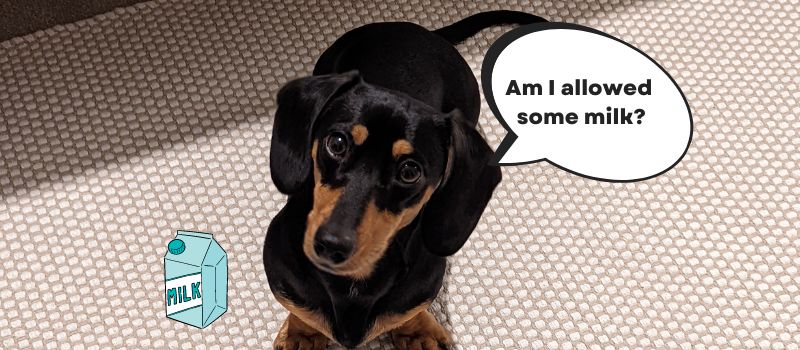Warning: Trying to access array offset on value of type bool in /home/u778996160/domains/dachshundtalk.com/public_html/wp-content/plugins/wp-word-count/public/class-wpwc-public.php on line 123
Warning: Trying to access array offset on value of type bool in /home/u778996160/domains/dachshundtalk.com/public_html/wp-content/plugins/wp-word-count/public/class-wpwc-public.php on line 123
Many people believe that milk is not good for Dachshund dogs, but this is not necessarily true. Dachshunds can drink milk, but they may not be able to digest it as well as other liquids. That’s why they should not drink too much.
Milk is a good source of hydration for dogs and can be a part of their diet. But you should know that milk can cause stomach upset in Dachshunds, so it is important to give them only a small amount.
Let’s dive in and look into this more and find out if giving your Dachshund milk is a good idea or if is it something you should avoid.
Common Misconceptions About Milk and Dachshunds
One of the most common misconceptions about milk and dachshunds is that they are lactose intolerant. While it is true that some dachshunds may be lactose intolerant, this is not always the case. Milk and dairy products are actually a great source of nutrition for Dachshunds, and they can provide many essential nutrients that your dog needs.
Another common misconception about Milk and Dachshunds is that they should not drink milk because it will make them fat. While milk does contain calories, it is also a great source of protein and calcium. If your Dachshund is getting enough exercise, then drinking milk (in moderation) will not make them fat.
Finally, some people believe that Dachshunds should not drink milk because it will give them diarrhea. This may be the case in some dogs, but it is not true for all dogs. If your Dachshund has diarrhea after drinking milk, you should stop giving them milk and consult your veterinarian.
What Kind of Milk Is Best for Dachshunds?
There are a few things to consider when choosing what kind of milk is best for your Dachshund.
- Whole milk is the most calorie-dense, so if your dog is trying to gain weight, this would be a good choice. However, whole milk can also be hard on a dog’s stomach, so if your Dachshund is prone to upset stomachs, you might want to try lower-fat milk.
- Skim milk is a good middle-of-the-road option. It has fewer calories than whole milk but more than lactose-free milk. Skim milk is also a good source of calcium and other nutrients.
- Avoid milk that has been treated with rBST or rBGH hormones. These hormones can be harmful to your dog’s health.
- Opt for organic milk whenever possible. This will ensure that your dog is getting the healthiest possible milk.
- Lactose-free milk is a good choice for lactose-intolerant dogs. This type of milk has all the same nutrients as regular milk but without lactose.
No matter which type of milk you choose, make sure to introduce it slowly to your dog. Start with small amounts and increase gradually over time. This will help your dog’s stomach adjust to the new food and avoid any digestive upset.
How to Introduce Milk to Their Diet?

If you’re like most dachshund owners, you want to do everything you can to ensure your dog has a long and healthy life. One important part of that is providing them with a nutritious diet.
While dachshunds are not typically lactose intolerant, some may have trouble digesting milk products. If you’re unsure how your dog will react, it’s best to introduce milk slowly and in small amounts.
Here are a few tips for introducing milk to your Dachshund’s diet:
- Start with a small amount of milk, about 1-2 tablespoons. Mix it in with their regular food and see how they tolerate it.
- If they seem to do well with the milk, you can gradually increase the amount you give them.
- Some dogs may prefer lactose-free milk products. You can find these at most grocery stores.
- If your dog does have trouble digesting milk, there are other calcium-rich foods you can give them, such as yogurt or cottage cheese.
- As always, consult your veterinarian before making any major changes to your dog’s diet. They may recommend a different type of milk or a different way to introduce it to your dog’s diet.
Keep an eye out for any side effects.
If this is the first time your dog is trying milk, it’s important to watch for any side effects.
The most common side effect of drinking milk is diarrhea. If your dog has diarrhea after drinking milk, stop giving them milk and consult your veterinarian.
Other possible side effects include bloating, gas, and vomiting. These are usually mild and should go away on their own. However, if your dog is vomiting or has severe diarrhea, please see your vet right away.
Following these tips can help ensure that your Dachshund enjoys a long, healthy life.
The Pros of Giving Your Dachshund Milk
There are several benefits to giving your dachshund milk.
- Milk is a great calcium source, essential for strong bones and teeth.
- It’s also a good source of protein, which is necessary for muscle development.
- Additionally, milk can help to soothe an upset stomach and can be a good way to rehydrate your dog after a strenuous exercise session.
- Some people also believe that milk can help to promote a shiny coat.
The Cons of Giving Your Dachshund Milk
While dachshunds may love the taste of milk, it’s not always the best thing for them.
- Milk is high in fat and can cause weight gain in dogs and digestive issues, especially if they spend most of their time in the apartment/home. It shouldn’t be an issue for active Dachshunds.
- Not all dogs can tolerate lactose, as we stated earlier, so if you’re unsure, it’s best to err on the side of caution and avoid giving your dachshund milk altogether.
Can Dachshund Puppies Drink Fresh Milk?
When it comes to giving milk to dachshund puppies, it’s best to err on the side of caution.
Puppies are more likely to be lactose intolerant than adult dogs, so it’s best to avoid giving them milk altogether. If you must give them milk, make sure it is diluted and only give them a small amount at a time.
It’s also important to note that cow’s milk differs from mother’s. Puppies should only drink their mother’s milk or specially formulated puppy milk replacer.
The Bottom Line – Should You or Shouldn’t You Give Your Dachshund Milk?
Dachshunds are not known for being particularly lactose tolerant, so they are generally okay to drink milk. However, if you decide to give your dachshund milk, it is important to do so in moderation and choose a low-lactose or lactose-free variety.
Hopefully, we’ve been able to provide you with the information you wanted. However, don’t consider this blog post as medical advice.
As always, consult your veterinarian before making any changes to your Dachshund’s diet.









